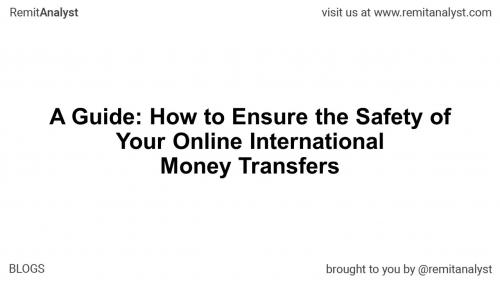A Guide: How to Ensure the Safety of Your Online International Money Transfers

Sending money internationally online is a convenient and efficient way to transfer funds, but it's essential to ensure that the process is safe and secure. This guide will give you a full rundown of the safety and security measures for sending money online and tips for keeping yourself safe from fraud. We will also include some facts and data better to understand the current state of online money transfers.
What are The Security Measures for Money Transfers?
First, let's talk about the security measures for online money transfers. Most banks and money transfer companies use encryption technology to protect their customers' personal and financial information. This technology ensures that the data is scrambled and can only be decrypted by authorized parties. A study by the Aite Group, a financial services research and advisory firm, found that 80% of consumers think encryption is the most crucial online transaction security feature. Additionally, many of these institutions also use multi-factor authentication, which requires customers to provide multiple forms of identification before they can access their accounts.
Another essential safety measure is using secure servers to store customer information. Many banks and money transfer companies use servers located in safe, off-site locations and protected by firewalls and other security measures. This ensures that customer information is protected from unauthorized access or hacking attempts. A study by the Ponemon Institute, a research firm focusing on data protection, found that a data breach costs a company an average of $3.86 million. This shows how important it is to keep customer information safe.
But even with these security measures, you need to be careful and take steps to keep fraud from happening. One of the most important things you can do is only to use banks and money transfer services that are known to be trustworthy. A survey by the Consumer Financial Protection Bureau (CFPB) found that 11% of people who used a money transfer service in the past year had a problem, like the transfer taking longer than expected or the fee is higher than expected. Before you use a service, find out about the company and read reviews from other customers. Also, never telling someone, you don't trust your personal or financial information is essential. Be wary of calls, emails, or texts you didn't ask for that ask for personal information.
Another critical step is to monitor your account regularly. Keep track of your transactions and check your account statements frequently to ensure that all transactions are legitimate. The Federal Trade Commission (FTC) says consumers lost $1.9 billion to fraud in 2019. The most common type of fraud reported was imposter scams. Immediately tell your bank or a money transfer company if you see anything odd.
What are Phishing Scams?
Also, you should be aware of phishing scams, which try to get you to give away personal information. These scams often come from fake emails or websites that look like they come from an actual bank or money transfer service. They may ask you to enter your personal information, including your login credentials, or to click on a link that leads to a fake website. According to the Anti-Phishing Working Group (APWG), there were over 200,000 unique phishing sites in circulation in 2019. To protect yourself from these scams, be sure only to enter personal information on websites that you trust, and never click on links in emails or text messages unless you are sure they are legitimate.
How Can One Stay Vigilant of Their Finances?
Another important aspect of online money transfers is the protection of your money. Banks and money transfer companies must have certain financial protections in place, such as deposit insurance, to ensure that customer funds are protected in the event of a bank failure or other financial crisis. Additionally, many of these institutions also have fraud protection policies in place, which can help to reimburse customers who have been a victim of fraud. However, it's essential to be aware of any limitations or exclusions that may apply to these policies and to understand the process for making a claim.
It's also important to know the fees associated with online money transfers. A study by the World Bank found that the average cost of sending $200 around the world is 7.1%. While this may seem relatively low, it can add up quickly for larger transfers, and it's essential to understand the fees associated with a particular service before you use it. Additionally, it's worth noting that many banks and money transfer companies offer different exchange rates for foreign currencies, which can also affect the overall cost of the transfer.
Let's look at some data and statistics to understand the current state of online money transfers. According to the World Bank, international remittances (money transfers) reached $689 billion in 2019. The top five countries receiving the most remittances are India, China, Mexico, the Philippines, and Egypt. Additionally, according to the Pew Research Center, in 2019, 64% of U.S. adults used the internet to send or receive money. This highlights the increasing popularity of online money transfers and the growing number of people who rely on them.
Online money transfers can be a convenient and efficient way to send money internationally. Still, knowing what safety and security measures are in place and what you can do to avoid fraud is essential. By researching and being vigilant, you can help ensure that your money transfers are safe and secure. Additionally, you can make better-informed decisions about sending money internationally by understanding the fees associated with online money transfers and the industry's current state.
Advertise on APSense
This advertising space is available.
Post Your Ad Here
Post Your Ad Here
Comments